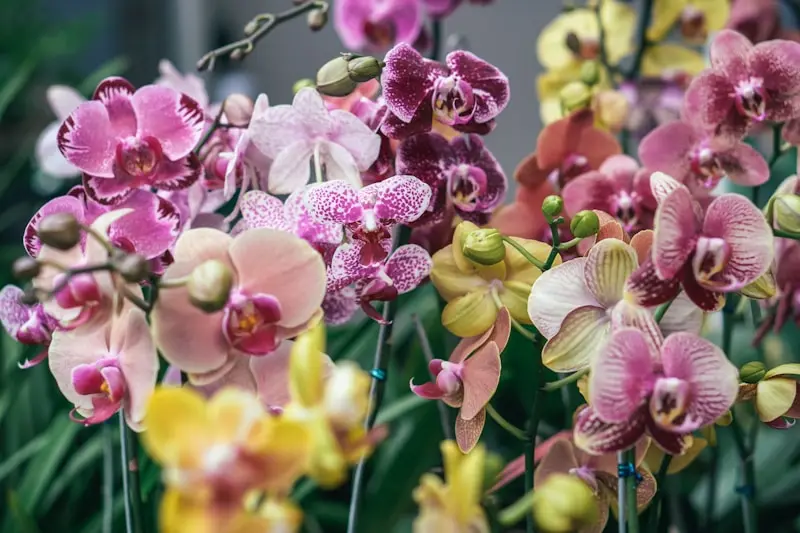
A recent botanical study is grounded in a vast global database on orchid pollination. This extensive resource includes records for nearly 3,000 species of these plants, showcasing a multitude of ingenious and specialized pollination strategies from various corners of the world. The information is meticulously organized by habitat, geographical distribution, and taxonomy. As a result, scientists have been able to identify clear patterns in the reproductive biology of the Orchidaceae family. According to Dr. Ryan Phillips, one of the study’s authors, this database reveals overarching trends and potential gaps in knowledge that limit our understanding of orchid biology on a global scale. This research has uncovered some remarkably deceptive tactics that these exotic flowers employ to attract their pollinators.
The Fascinating Nature of Orchids
Even Charles Darwin recognized the astonishing nature of the Orchidaceae family and used them to study evolution. He was particularly captivated by the unique features of these flowers, asserting that their complex structures are evolutionary adaptations aimed at enhancing pollen transfer between plants, thereby increasing the fitness of their offspring. As Dr. Phillips explains, due to their unusual appearance and often unconventional pollination strategies, orchids serve as prime examples of how flowers adapt to their pollinators. Darwin hypothesized that the Madagascar orchid Angraecum sesquipedale, with its extraordinary 16-inch nectar spur, would be pollinated by a moth with a corresponding long proboscis.
What Did the Researchers Discover?
A team of researchers led by Dr. James Ackerman found that the reproduction of over 75% of orchids relies on pollinators. They also discovered that nearly half of the studied flowers in this family do not reward their pollinators. Instead, these plants employ cunning deception to attract them. Most orchids that use deceptive tactics depend solely on a single species of pollinator. Consequently, Dr. Nushka Reiter emphasizes the vulnerability of these plants to human-induced threats, such as climate change. According to her, specialization on one type of pollinator makes many orchids particularly susceptible. If these pollinators were to disappear, the remarkable flowers could face extinction.
Mimicry and Deception in Orchids
Researchers believe that the pollination strategies of orchids may yield even more surprises than a science fiction novel. For instance, many of these plants in Australia are leaders in mimicry, deceiving a range of insects—from wasps and bees to mosquitoes. In South Africa, some orchids imitate carrion, while on Réunion Island, they mimic tropical forest fruits, and in Brazil, they replicate the scent of aphids. These intricate tricks are designed to fool pollinators. It is known that in the American tropics, hundreds of orchid species produce scents that some bees collect for their courtship rituals. A striking example is the Australian orchid Caladenia barbarea, named after a comic book heroine known for her romantic escapades. This name aptly reflects the plant’s deceptive pollination technique.
Deceptive Orchids
Dr. Phillips highlighted that a defining characteristic of the Orchidaceae family is the high proportion of species that manipulate through tricks. They exploit the sensory abilities of pollinators using chemical, visual, or tactile stimuli, often in combination. The study identifies two main types of orchid deception: nutritional and sexual. In the first case, the plant mimics a specific food source to lure the pollinator. In the case of sexual deception, orchids entice male pollinators to visit flowers that emit signals resembling those of receptive female insects. As Dr. Phillips notes, the floral signals can be so convincing that insects attempt to mate and even ejaculate. The scientist recounts witnessing wasps fly through a car window at a traffic light and begin mating with orchids on the front seat.
These deceptive strategies are not as rare as one might think. It is known that around 20 genera worldwide, encompassing hundreds of orchid species, employ this technique. There is also a third type of deception previously observed in these plants, where orchids imitate desirable egg-laying sites for female insects—such as mushrooms, dung, or carrion.
Intriguing Discoveries About Orchids
The research provides a wealth of intriguing findings. For example, the diversity of orchids in Australasia and Africa has been relatively well-studied, covering 15% and 20% respectively. However, species in the temperate and tropical climates of Asia and the tropics of South America remain largely unexplored. The database also indicates that approximately 76% of orchids are entirely dependent on pollinators for reproduction, and about 55% have only one known species of pollinator. While 54% of Orchidaceae species offer some reward to their pollinators, deception has been recorded in 46% of species. The most common deceptive tactic was food mimicry, employed by 60% of deceptive species. Sexual deception was present in 20 orchid genera.
Wasps and bees were the most common pollinators, although flies and mosquitoes were not far behind. However, researchers note that this exceptional database, which encompasses over 2,900 species, still represents less than 10% of the Orchidaceae family. According to Dr. Phillips, tropical regions of Africa, South America, and Asia are underrepresented in orchid pollination studies, particularly among epiphytes. He believes that studying the pollination of these plants presents enormous opportunities to uncover new and strange strategies in this process. Additionally, it may lead to a better understanding of the adaptations of flowering plants that have evolved to attract pollinators. Beyond its scientific implications, this research is also crucial for the conservation of many rare orchids, whose survival depends on a single species of insect.
